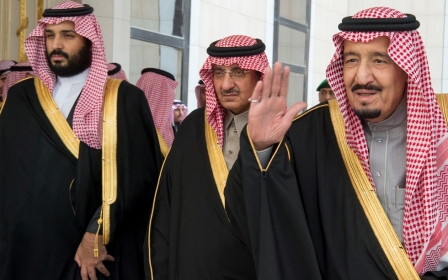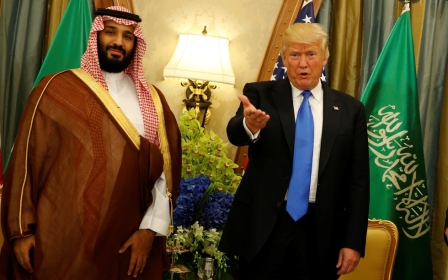Saudi crown prince: Israelis have the right to a homeland
The crown prince and de facto leader of Saudi Arabia said Israel has a "right" to a homeland, a notable shift in the kingdom's position, as outlined in an interview with The Atlantic's editor-in-chief, Jeffrey Goldberg, on Monday.
Saudi Arabia and Israel still have no formal diplomatic relations, but behind the scenes, improvements in their ties have accelerated in recent years.
Both countries see Iran as their biggest outside threat and the United States as their key ally.
Israel's conflict with the Palestinians had long proved an obstacle to a full rapprochement, as Riyadh voiced support for their right to sovereignty.
But now bin Salman appeared to put the land claims on an equal footing.
The crown prince was asked by Jeffrey Goldberg whether the "Jewish people have a right to a nation-state in at least part of their ancestral homeland?"
"I believe that each people, anywhere, has a right to live in their peaceful nation," said the prince, who is on a three-week US tour.
"I believe the Palestinians and the Israelis have the right to have their own land," he added.
"But we have to have a peace agreement to assure the stability for everyone and to have normal relations."
Since 2002, Saudi Arabia has been the main sponsor of the Arab Peace Initiative, which envisions a two-state solution to the Israeli-Palestinian conflict.
But no senior Saudi official is known to have previously accepted that Israel has a "right" to any land beyond the practical need to secure a lasting deal.
We have religious concerns about the fate of the holy mosque in Jerusalem
- Mohammed bin Salman
If, as expected, the crown prince succeeds his octogenarian father King Salman and ascends to the Saudi throne, he will also become guardian of Islam's holiest shrines.
But he told Goldberg he had no "religious objection" to Israelis living alongside Palestinians, so long as the main Muslim holy site in Jerusalem - the Al-Aqsa mosque compound - is protected.
"We have religious concerns about the fate of the holy mosque in Jerusalem and about the rights of the Palestinian people," he said.
"This is what we have. We don't have any objection against any other people."
Goldberg also asked bin Salman about Saudi’s war in Yemen and the kingdom’s previous involvement in funding Wahhabi groups – a fundamentalist form of Sunni Islam.
Bin Salman said he did not know what Wahhabism is - because it could not be defined - and told Goldberg that the campaign in Yemen was a security issue for the Saudis.
New MEE newsletter: Jerusalem Dispatch
Sign up to get the latest insights and analysis on Israel-Palestine, alongside Turkey Unpacked and other MEE newsletters
Middle East Eye delivers independent and unrivalled coverage and analysis of the Middle East, North Africa and beyond. To learn more about republishing this content and the associated fees, please fill out this form. More about MEE can be found here.




